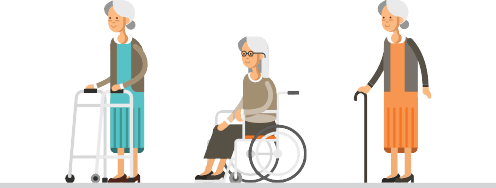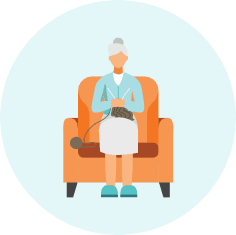FINDING THE RIGHT MOBILITY AIDS FOR SENIORS
Mobility Aids for Seniors
Many seniors experience difficulty getting around independently. Mobility aids can offer stability and support. If a senior is unstable performing motions like sitting down or walking, it is essential to find mobility aids that fit their needs and ensure their safety.
Approximately 1/3 of older people living at home fall at least once a year. It’s common for seniors to need mobility aids for safety and support. (Source: MerckManuals)
Common Mobility Aids for Getting Around
For seniors living at home and maintaining a high level of independence, common mobility aids are designed to help them get around. Options include:

Canes
Designed to increase stability and compensate for minimal balance issues.

Walkers
Help support those with significant stability problems but moderate upper body strength.

Rollators
Designed for those with severe stability issues who lack upper body strength and balance.

Power Scooters
Support those who cannot walk long distances but have upper body control and stamina.

Wheelchairs
Offer mobility to those unable to walk safely on their own. Variations of steering ability available.
(Source: Aging Care)
FINDING THE RIGHT MOBILITY AIDS FOR SENIORS
C A R E G I V E R S
Possible Results of Senior Falls
Sometimes mobility issues are just inconvenient for seniors. Other times they put seniors at risk of falling. Falls can be very dangerous for the aging. Falling can result in:
- Bruises
- Fractures
- Breaks
- Need for physical therapy
- Surgical correction
- Hospitalization
- Death
(Source: MerckManuals)
Home Care Tip:
Style matters. If seniors seem unwilling to accept mobility aids, consider options that look sleek or fit their sense of style. Sometimes a device that feels personalized makes a difference for seniors struggling to accept necessary changes.
Mobility Problem Risk Factors
A number of issues can increase seniors’ risk of struggling with mobility and balance, including:
- Diminished eyesight
- Diabetes or heart disease
- Thyroid problems
- Nerve issues
- Medications
- Dizziness
- Muscle weakness
- Gait changes
- Postural hypotension
- Foot pain, deformities, or poorly-fitting footwear
- Confusion or memory problems
- Environmental factors like lack of lighting
(Source: NIA)
Paying for Mobility Aids
Insurance companies, as well as some grant or senior care nonprofits, may help cover the costs of mobility aids. Ask a doctor or local agency for the aging for ideas on where to start seeking financial assistance for mobility devices.
(Source: DailyCaring)
Mobility Aids for a Safer Home Environment
Some mobility aids aren’t designed to support long-range motion. Instead, they make the home environment safer and increase independence with specific tasks. Consider installing:
- Rails along stairs, near bathroom fixtures, in hallways, etc.
- Tub/bath transfer seats or benches
- Supportive seat cushions
- Grab handles for getting in/out of a car, bed, couch, or chair
- Rolling over-bed or over-couch tables
- Additional lighting or voice command lighting to improve visibility
- Non-slip flooring that is securely tacked down
- Stairlift
- Ramps to replace stairs
(Source: ScripHessCo)
© 2023 Mobility Aids Guide
- Published in ALZHEIMER, CAREGIVERS, DEMENTIA, IN HOME CARE
HOW TO HELP HOMEBOUND SENIORS STAY ACTIVE
Tips for Helping Homebound Seniors Stay Active

Seniors who are homebound face extra challenges. Loneliness, lack of physical activity, and more can become problems. Help seniors stay active.
Being homebound as a senior can increase risk of loneliness, stress, lack of physical activity, and more. It’s important for seniors’ health to stay active even if unable to get out.
Up to 3.6 million people over 65 in the US are considered housebound. Often, those who are housebound suffer from medical and/or mental illnesses. Between the isolation of being at home and the challenges of illnesses, homebound seniors often have trouble staying active. (NCBI)
Common Challenges Homebound Seniors Face
Seniors who are homebound often suffer from a medical problem, psychiatric disability, or a memory disorder. When seniors are homebound, they often face challenges like:
- Being isolated
- Feelings of loneliness
- Hardship getting medical care/going to appointments
- Difficulty buying groceries and other essentials
- Mobility problems within the home
- Lack of exercise and physical activity
- Trouble finding mental stimulation
- Few conversations or social connections
- Decreased quality of life
(Healthline)

C A R E G I V E R S
Keep Homebound Seniors Active
Top Reasons Seniors Become Homebound
- Limited mobility
- Weakness
- Poor balance
- Medical conditions
- Memory disorders
- Mental health problems
- Lack of social support or assistance
(Sciencedirect)
Top Ways to Help Homebound Seniors Stay Mentally Sharp
- Crosswords
- Puzzles
- Reading
- Learning something new
- Regular conversations
- Practicing memorization
Home Care Tip:
Often being homebound can be discouraging for seniors. Help them stay positive and encourage them to stay active by participating in their activities.
How to Help Homebound Seniors Stay Active
Staying active can help seniors who are homebound to live higher quality, healthier lives. Use these tips to help seniors stay active:
Find Exercises That Seniors Can Do At Home

Physical activity is a natural form of stress relief. It also helps seniors stay flexible, fit, and healthy. Some great exercises for homebound seniors include:
- Stretching
- Seated strength training
- Aerobic exercise
- Yoga
Help Seniors Enjoy a New Hobby

Trying something new can help seniors stay sharp and active. Activities like knitting, reading, painting, wood carving, and scrapbooking are great choices.
Set Seniors Up in Online Communities
There are many ways for seniors to connect with others online. If they really like writing, for example, they could write for a blog. Online communities, chat rooms, and digital games all allow seniors to socialize without leaving home.
Play Games Regularly
If seniors have favorite board or card games, make time to play on a regular basis. They may also be able to play some games by themselves.
Encourage Visitors

Socializing doesn’t require going out. Seniors can connect with others by:
- Having visitors over
- Hosting groups for activities
- Using Skype to catch up with friends or loved ones
Taking Care of Their Place
For seniors able to perform some maintenance, cleaning, or decorating tasks, it’s good to keep at it. These sorts of activities can help seniors stay active and take pride in their home.
(ClearCare Online)
References:
- Published in IN HOME CARE



